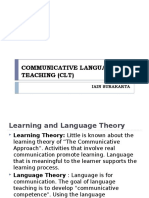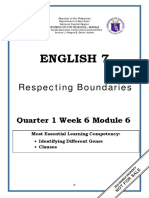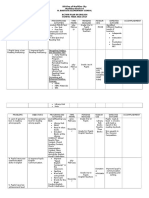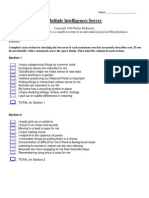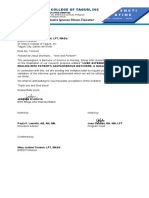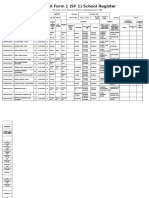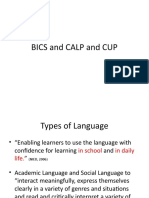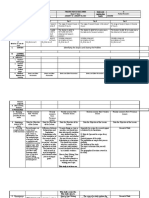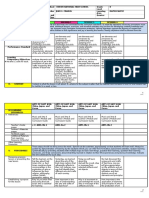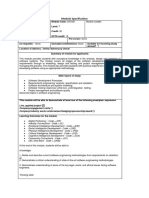0 ratings0% found this document useful (0 votes)
345 viewsSample Daily Lesson Log
This document contains a daily lesson log template for teachers. The template includes sections for objectives, content, learning resources, procedures, and reflection. The procedures section outlines steps for establishing purpose, reviewing previous lessons, presenting new content, discussing concepts, practicing skills, developing mastery, finding applications, making generalizations, and evaluating learning. It also includes space for additional remedial or enrichment activities based on formative assessments. The reflection section prompts the teacher to evaluate aspects of the lesson such as student performance and strategies that worked well.
Uploaded by
Jean Marsend Pardz FranzaCopyright
© © All Rights Reserved
Available Formats
Download as DOCX, PDF, TXT or read online on Scribd
0 ratings0% found this document useful (0 votes)
345 viewsSample Daily Lesson Log
This document contains a daily lesson log template for teachers. The template includes sections for objectives, content, learning resources, procedures, and reflection. The procedures section outlines steps for establishing purpose, reviewing previous lessons, presenting new content, discussing concepts, practicing skills, developing mastery, finding applications, making generalizations, and evaluating learning. It also includes space for additional remedial or enrichment activities based on formative assessments. The reflection section prompts the teacher to evaluate aspects of the lesson such as student performance and strategies that worked well.
Uploaded by
Jean Marsend Pardz FranzaCopyright
© © All Rights Reserved
Available Formats
Download as DOCX, PDF, TXT or read online on Scribd
You are on page 1/ 3
DAILY School Grade Level
Teacher Learning Area
LESSON LOG
Teaching Dates and Time Quarter
Monday Tuesday Wednesday Thursday Friday
I. WEEKLY OBJECTIVES
A. Content Standards
B. Performance Standards
C. Learning Competencies / Objectives
Write the LC code for each
II. CONTENT
III. LEARNING RESOURCES
A. References
1. Teacher’s Guide pages
2. Learner’s Mat
3. \erials pages
4. Textbook pages
5. Additional Materials from Learning
Resource (LR) portal
B. Other Learning Resources
IV. PROCEDURES
A. Establishing a purpose for the lesson
Motivate them to learn the new lesson.
Encourage them to ask questions about the
new topic. This will help establish a reason for
learning the new lessons.
B. Reviewing yesterday’s lesson or
Presenting the new lesson
Connect the lesson with learners’ prior
knowledge. Explicitly teach to the learners
how the new lesson connects to previous
lessons. Review and present new lessons in a
systematic manner.
C. Presenting examples/ instances of the
new lesson
Provide examples of the new lesson. Show
what the instances of the content and
competencies. This is where the concepts are
clarified.
DAILY School Grade Level
Teacher Learning Area
LESSON LOG
Teaching Dates and Time Quarter
Monday Tuesday Wednesday Thursday Friday
D. Discussing new concepts and practicing new
skills #1
(Leads to Formative Assessment 1)
Discuss the concepts. Prepare good questions for
this. Listen to the answers of learners to gauge if
they understood your presentation lesson. If not,
then reteach. If they have understood, then
proceed to deepening the lesson.
E. Discussing new concepts and practicing new skills #2
(Leads to Formative Assessment 2)
Deepen the lesson with new ways to apply the
learning. Pair, group and team work might be a good
way to help learners discuss the lesson among
themselves. They can present their work to the class
and this serves as the teachers’ way of assessing if the
concepts are solidifying and if their skills are
developing.
F. Developing mastery
(Leads to Formative Assessment 3)
Develop mastery through more individual work
activities such as writing, creative ways of
representing learning, dramatizing, etc. Let children
demonstrate their learning through assessable
activities such as quizzes, worksheets, seat work, and
games. When the children demonstrate learning, then
proceed to the next step. Add activities as needed
until formative assessment shows that the learners
are confident in their knowledge and competencies.
G. Finding practical applications of concepts and
skills in daily living
Develop appreciation and valuing for their learning by
bridging the lesson to daily living. This will establish
relevance in the lesson.
H. Making generalizations and abstractions about
the lesson
Conclude the lesson by asking children good questions
that will help them crystallize their learning so they can
declare the knowledge and demonstrate their skills.
DAILY School Grade Level
Teacher Learning Area
LESSON LOG
Teaching Dates and Time Quarter
Monday Tuesday Wednesday Thursday Friday
I. Evaluating learning
Assess whether the learning objectives have been met.
Evaluation should tap into the three types of
objectives.
J. Additional activities for application or
remediation
Based on the formative assessments, provide children
with enrichment or remedial activities. Those who are
demonstrating difficulties with the lesson should be
given extra time by the teacher for additional
teaching.
V. REFLECTION
A. No. of learners who earned 80% on the formative
assessment
B. No. of learners who require additional activities for
remediation.
C. Did the remedial lessons work? No. of learners who
have caught up with the lesson.
D. No. of learners who continue to require remediation
E. Which of my teaching strategies worked well? Why did
these work?
F. What difficulties did I encounter which my principal or
supervisor can help me solve?
G. What innovation or localized materials did I use/discover
which I wish to share with other teachers?
You might also like
- English3 - Q2 - Mod1 - Using Be-Verbs Correctly - V2100% (6)English3 - Q2 - Mod1 - Using Be-Verbs Correctly - V221 pages
- Questionnaire: Instructions: Tick ( ) in The Provided Box A. RespondentNo ratings yetQuestionnaire: Instructions: Tick ( ) in The Provided Box A. Respondent2 pages
- A Proposed Research Project Presented To The Faculty of Graduate Studies University of Saint AnthonyNo ratings yetA Proposed Research Project Presented To The Faculty of Graduate Studies University of Saint Anthony20 pages
- Lesson 1: Writing The Review of Related LiteratureNo ratings yetLesson 1: Writing The Review of Related Literature8 pages
- English Language Proficiency in The Philippines100% (1)English Language Proficiency in The Philippines4 pages
- Contextualized Learning Material (CLM) in Developing Conceptual Understanding of Grade 7 MathematicsNo ratings yetContextualized Learning Material (CLM) in Developing Conceptual Understanding of Grade 7 Mathematics8 pages
- Students' Least Mastered Learning Competencies in English For Academic Professional Purposes: Inputs For Developing Evaluating Digitized Multimodal Learning MaterialsNo ratings yetStudents' Least Mastered Learning Competencies in English For Academic Professional Purposes: Inputs For Developing Evaluating Digitized Multimodal Learning Materials5 pages
- Surigao Del Norte National High School Senior High SchoolNo ratings yetSurigao Del Norte National High School Senior High School8 pages
- Reading Is The Mother of Any Ability To StudyNo ratings yetReading Is The Mother of Any Ability To Study34 pages
- WEEKLY LEARNING PLAN Englishwk 4 Separate SheetNo ratings yetWEEKLY LEARNING PLAN Englishwk 4 Separate Sheet2 pages
- Linguistic Functional Feature Analysis of English Legal MemorandumNo ratings yetLinguistic Functional Feature Analysis of English Legal Memorandum7 pages
- Lesson 4: 1 - Reading Readiness 2 - Stages of A Reading Comprehension Lesson 3. Stages of Literacy HourNo ratings yetLesson 4: 1 - Reading Readiness 2 - Stages of A Reading Comprehension Lesson 3. Stages of Literacy Hour23 pages
- Demonstration Lesson Plan in English 10 (Autorecovered)No ratings yetDemonstration Lesson Plan in English 10 (Autorecovered)6 pages
- DLP Technical and Operational DefinitionNo ratings yetDLP Technical and Operational Definition9 pages
- English For Academic and Professional Purposes - Week1 PDFNo ratings yetEnglish For Academic and Professional Purposes - Week1 PDF7 pages
- Factors That Affect Reading Progress IntelligenceNo ratings yetFactors That Affect Reading Progress Intelligence3 pages
- The Philippine Professional Standards For Teachers100% (1)The Philippine Professional Standards For Teachers52 pages
- General Instructions: Please DO NOT Write Anything in Pretest Sheet. Please Use Yellow Paper/the Provided Answer Sheet For Your AnswersNo ratings yetGeneral Instructions: Please DO NOT Write Anything in Pretest Sheet. Please Use Yellow Paper/the Provided Answer Sheet For Your Answers2 pages
- A Detailed Lesson Plan in English IV-SVANo ratings yetA Detailed Lesson Plan in English IV-SVA6 pages
- Deped Order No. 73 S. 2012 General Guidelines For The Assessment and Rating of Learning OutcomesNo ratings yetDeped Order No. 73 S. 2012 General Guidelines For The Assessment and Rating of Learning Outcomes2 pages
- Supplementary Modules in Grammar Through Literature As Integrated Lessons For Grade 7 EnglishNo ratings yetSupplementary Modules in Grammar Through Literature As Integrated Lessons For Grade 7 English12 pages
- Anagrams in Enhancing The Learner's Vocabolary in Filipino Language Using Wordwall100% (1)Anagrams in Enhancing The Learner's Vocabolary in Filipino Language Using Wordwall19 pages
- Practical Reserach 2 Lesson Plan (Background of The Study)No ratings yetPractical Reserach 2 Lesson Plan (Background of The Study)3 pages
- Research No. 1019027: Validation and Utilization of A Developed Contextualized Learning Module For Science FiveNo ratings yetResearch No. 1019027: Validation and Utilization of A Developed Contextualized Learning Module For Science Five15 pages
- Improving Grade 2 Pupils' Skills in Identifying Story Elements Using Graphic CardsNo ratings yetImproving Grade 2 Pupils' Skills in Identifying Story Elements Using Graphic Cards39 pages
- Lesson Plan - There Is No Frigate Like A Book by Emily Dickinson100% (3)Lesson Plan - There Is No Frigate Like A Book by Emily Dickinson2 pages
- Region Memorandum Ad 25 Deped Soccsksargen Region Revised Guidelines On The Implementation of Reclassification For Teaching 1No ratings yetRegion Memorandum Ad 25 Deped Soccsksargen Region Revised Guidelines On The Implementation of Reclassification For Teaching 110 pages
- English Only Policy (EOP) S.Y. 2019-2020 A. Program DescriptionNo ratings yetEnglish Only Policy (EOP) S.Y. 2019-2020 A. Program Description2 pages
- West Visayas State University: Extension Campus at Himamaylan CityNo ratings yetWest Visayas State University: Extension Campus at Himamaylan City2 pages
- Sample Checklist For A Schools Assessment Practices100% (2)Sample Checklist For A Schools Assessment Practices1 page
- Monday Tuesday Wednesday Thursday Friday: WeeklyobjectivesNo ratings yetMonday Tuesday Wednesday Thursday Friday: Weeklyobjectives3 pages
- Journal of Global Biosciences: Research PaperNo ratings yetJournal of Global Biosciences: Research Paper4 pages
- A Conceptual Framework For Parent Involvement: Barbara Tucker Cervone and Kathleen O'LearyNo ratings yetA Conceptual Framework For Parent Involvement: Barbara Tucker Cervone and Kathleen O'Leary3 pages
- Filipino English Math Science AP TLE Mapeh ESPNo ratings yetFilipino English Math Science AP TLE Mapeh ESP1 page
- Study On The Damping Performance Characteristics Analysis of Shock Absorber of Vehicle by Considering Fluid ForceNo ratings yetStudy On The Damping Performance Characteristics Analysis of Shock Absorber of Vehicle by Considering Fluid Force2 pages
- Masterpieces of Oman: 10 Million Visitors Flocks City Centre MuscatNo ratings yetMasterpieces of Oman: 10 Million Visitors Flocks City Centre Muscat17 pages
- Social and Educational Influences For English Language Learning Motivation of Hong Kong Vocational StudentsNo ratings yetSocial and Educational Influences For English Language Learning Motivation of Hong Kong Vocational Students14 pages
- Analyzing The Training Needs of EVN Report: Human Resource ManagementNo ratings yetAnalyzing The Training Needs of EVN Report: Human Resource Management31 pages
- Csibra Gergely 2011 Philosophical TransactionsNo ratings yetCsibra Gergely 2011 Philosophical Transactions10 pages
- Literature Review On Risk Management in Banks PDF100% (1)Literature Review On Risk Management in Banks PDF9 pages
- SDLP 03 - Organization Theories and Applications100% (1)SDLP 03 - Organization Theories and Applications4 pages
- What Are Variables? - Lesson Plan: Class: Date: Standard(s)No ratings yetWhat Are Variables? - Lesson Plan: Class: Date: Standard(s)3 pages
- Internship PROJECT RECORD STARTING PAGES (1)No ratings yetInternship PROJECT RECORD STARTING PAGES (1)9 pages
- The New Educational Curriculum in FinlandNo ratings yetThe New Educational Curriculum in Finland16 pages
- Rockwoods International School, Udaipur: Session - 2022-23No ratings yetRockwoods International School, Udaipur: Session - 2022-232 pages
- Lesson Plan Assessment Rubric & Lesson Plan Template Dec 2020No ratings yetLesson Plan Assessment Rubric & Lesson Plan Template Dec 202011 pages
- Detailed Lesson Plan No Kay Mater Revise 3No ratings yetDetailed Lesson Plan No Kay Mater Revise 322 pages








